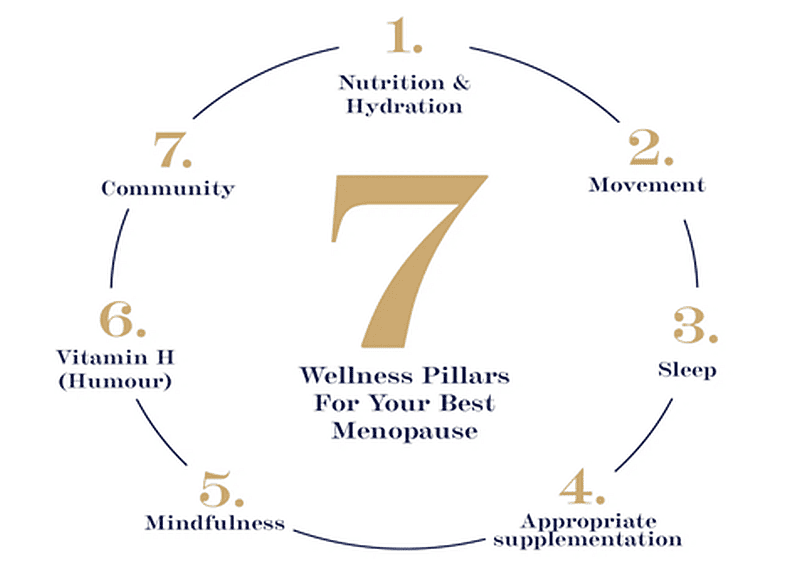If you aren’t very careful about your daily water intake, it’s time you give it a second thought, especially if you are in your late 40s or early 50s and are nearing menopause. Drinking ample water is always essential to keep your body going.
In menopause, you must be more conscious about your fluid intake. Menopause is synonymous with hot flashes alongside other troublesome symptoms, which make your body lose fluid. So, if you do not drink sufficient water or fluid to make up for the loss, it could lead to dehydration.
For an elaborate analysis of how vital it is to stay hydrated in menopause, let’s check out the excerpts from our team’s interview with Mrs.Sabrina Johnson.
Mrs. Johnson has expertise in medical writing and a background in obstetrics and gynecology. This gives her a clear understanding of the hassles women face in menopause. She does her best to address them and help women in the menopause transition and menopause phase.
Menopause and Hydration

Image source: Meno-me.com
Q. Why should you stay hydrated in menopause?
Irrespective of whether you are in menopause, you should pay special attention to your fluid intake. Water and other healthy fluids help to regulate your body temperature. It even lubricates the joints and protects the spinal cord. One of the most significant benefits of water is that it allows the body to eliminate waste products through urination, bowel movements, and perspiration.
In menopause, the chances of dehydration are high. The reasons for the same are umpteen. Estrogen is significant in helping our body’s tissues retain moisture. When there’s a decrease in estrogen levels, the body’s moisture content goes down as well. We cannot miss out on the hot flashes and night sweats.
Women facing increased incidences of these vasomotor symptoms (i.e., night sweats and hot flashes) should consciously drink sufficient fluid to compensate for the water their body is losing due to increased perspiration.
Moreover, the low estrogen levels could trigger several symptoms like dry skin, sleep problems, mood swings, vaginal dryness, etc.
Low estrogen levels are one of the causes of fluid retention in menopause. Of the various ways in which you could control the same, one of them is by staying hydrated. Drinking sufficient fluid, specifically water, will boost your overall health.
Q. How much fluid intake will save you from dehydration in menopause?

As per estimations, women must drink around 11.5 cups of fluid daily, 2.7 liters. If you are nearing menopause or have already entered the menopausal stage, you must adhere to this number even more. Foods will comprise about 20% of fluid intake. The rest of it should be met, of which at least 2/3rds must include water. If you are more susceptible to night sweats and hot flashes, discuss your fluid intake with your doctor.
The remaining may come from healthy drinks like juices, herbal teas, etc. Avoid caffeinated and carbonated beverages in menopause, as they aren’t healthy.
Q. What happens when women do not drink sufficient water in menopause?
Menopause comes with several symptoms. Not just hot flashes and night sweats. There are other hassles as well. The low estrogen levels could trigger digestive problems, skin issues, brittle nails, etc. When you stay hydrated and meet your recommended fluid intake, you can manage most of these issues to a great extent.
Women, when transitioning into menopause, often go through cognitive impairments. Many women in their 40s and 50s often complain of forgetfulness and lessened attention span. The term brain fog is used to refer to this condition. It isn’t a medical term, though. You must be wondering what water has to do with brain fog. Here’s the explanation.
The brain requires sufficient amounts of water for better functioning. When you are dehydrated, the brain doesn’t receive adequate water, which leads to cognitive impairment. Studies have shown that your brain’s functioning is affected when dehydrated. So, in menopause, when you are already at risk of brain fog, you must be extra cautious about your water intake.
The fluctuating hormone levels and lack of sleep may even make you tired and drained when you’ve reached the menopausal age. To top it off, you’ll feel even more fatigued when you do not drink sufficient fluids.
Low estrogen levels also affect bone health, resulting in inflammation and joint pain. Water is functional in lubricating the joints. When you do not drink sufficient amounts of water, it will worsen your joint pain.
In a nutshell, staying hydrated helps you manage most of the menopausal symptoms with ease. Losing fluid, which equals 2% of your weight, could trigger dehydration. So you have to be careful.
Q. What drinks should you have, and which ones should you avoid in menopause?
When you are transitioning into menopause or already in menopause, you need to watch out for what you eat and drink. Water comes above all, as it keeps you healthy in many ways, as mentioned already. You can even include herbal teas on your list. Some teas that help to manage menopausal symptoms are:
- Black cohosh root tea
- Chasteberry tree tea
- Red clover tea
- Red raspberry root tea
- Valerian root tea
- Licorice tea
However, before adding herbal teas, consult the doctor, as some have blood-thinning properties. You can add some juices to your list of drinks during menopause. These include:
- Apple juice
- Lemon juice
- Broccoli juice
- Carrot juice
There are some foods as well which help you remain hydrated. The ones that need mention are:
- Honeydew
- Cantaloupe
- Watermelon
- Orange
- Peach
- Broccoli
- Cucumber
- Lettuce
- Bell pepper
- Zucchini
There are some drinks to avoid, and alcohol tops the list. If you cannot eliminate it from your list, ensure you do not have more than a drink a day. Besides causing dehydration, alcohol can also make some menopause symptoms, like hot flashes, worse. Caffeinated drinks and carbonated beverages are also a no-no when in menopause.
The caffeine content in tea has diuretic properties. You could feel dehydrated when you drink too much tea, between 6 and 13 cups.
Q. How do I know if I am dehydrated?
If you are dehydrated, your body will show some of the signs mentioned below:
- Dark, smelly urine
- Dry lips, tongue, and mouth
- Increased thirst
- Sunken eyes
- Increased fatigue
- Increase hot flashes and night sweats (it’s a two-way communication; hot flashes cause dehydration, and the other way round)
- Frequent headaches
- Feeling constipated
- Increased hunger and sugar cravings
Conclusion
Staying hydrated in menopause is vital. You need to be careful about meeting your daily fluid intake. Besides water, choose fluids that would keep you healthy, and avoid unhealthy beverages. If you experience symptoms of dehydration to the extent that your daily living is affected, contact the doctor immediately. When you care for what you eat and drink, you can manage most menopausal symptoms well.
Article Submitted By Community Writer




